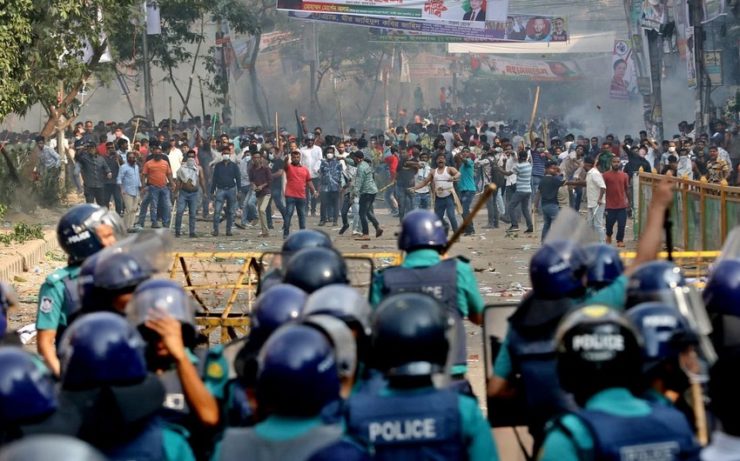
General elections will be conducted in Bangladesh on January 7, 2024. The country has emerged as one of the rapidly developing economies in the region under the incumbent Prime Minister, Sheikh Hasina. She has inaugurated numerous new projects including the Bangabandhu tunnel, the new elevated Dhaka expressway, the 2400 MW Rooppur nuclear power plant, Terminal 3 of the Hazrat Shahjalal International Airport (HSIA), Khulna-Mongla Port Railway line, the Akhaura-Agartala broad-gauge line, Unit 2 of the Maitri Power plant, and MRT Line 6. The rationale behind the rapid inauguration of such a large number of projects is to increase the political significance of the party and to expand its vote bank. She wants to convey to the Bengali citizens that the country has made significant economic tides under her leadership.
Despite all these projects and serving in the government for a long tenure, the Awami League (AL) is still anxious about the election results. The reason behind the fear among the AL benches is the current political turmoil in the country. Bangladesh is one of the fastest-growing industrial countries in the region. This industrial growth resulted in employing a huge number of masses. However, the labor in the country is struggling for its rights. Recently, the country saw a colossal protest by industrial labor.
Furthermore, the largest opposition party in the country – the Bangladesh National Party (BNP) – also took to the streets on 28th October against the government policies. This was one of the major rallies in the history of the country. The government has arrested thousands of BNP leaders and party members, accusing them of it, as the party’s rally resulted in the death of a policeman and a party leader due to a clash. The country already had almost 88000 BNP members incarcerated. As per reports, the government has arrested over 22000 members after the recent clashes. The jails in the country are already filled beyond their capacity. BNP has boycotted the elections on the accusations of partiality of elections. This has raised serious concerns about the credibility of these elections.
On the other hand, the Awami League is accusing international players of interfering in the upcoming elections. The incumbent Prime Minister of the country has accused the United States of planning to oust her from power. The imposition of visa restrictions by the United States on some Awami League leaders is supplementing the suspicions of the party. The Awami League is facing a precarious situation due to all these circumstances. The vocal stance of US President Joe Biden on the credibility of the upcoming elections. Although the US is challenging the AL government under the pretense of protection of human rights in the country, the increasing ties between Bangladesh and China under the incumbent government seem to be the true reason behind this opposition by the United States.
Moreover, Bangladesh is also enhancing its ties with Russia. Recently, the two countries have conducted naval drills in the Bay of Bengal. This move increased the security threats for the United States in the Indian Ocean due to the increasing presence of Russia. Bangladesh is also building the first nuclear power plant of the country by Russian collaboration. On the domestic front, the BNP has accused Prime Minister Sheikh Hasina of politicizing the electoral apparatus of the country. These domestic and international issues have exacerbated the political situation of the Awami League in the upcoming elections. Moreover, these challenges are likely to impinge the economy and political stature of the country internationally. Bangladesh can face difficulties at the international level due to its independent foreign policy decisions. The country is increasingly tilting towards China. It is also a member country of China’s Belt and Road Initiative (BRI). In addition, the country is also re-establishing its ties with Pakistan. India had great influence over Bangladesh since the latter’s inception. However, Bangladesh’s revisiting of its foreign policy decisions has resulted in bitterness in its relations with India. China’s presence in the neighboring country of India poses a great security threat for the latter.
Bangladesh is likely to suffer due to its changing domestic and international policies. Most of the international monetary institutions, including the IMF and the World Bank, are under the US influence. The country could face severe repercussions of these policies at the US-backed institutions. Having India on the opposite side can also result in the isolation of the country at different multilateral institutions. BRICS holds great potential for the poor nations of the world. It provides them an opportunity to raise their voices independently without any pressure from other member countries. Bangladesh can gain significant benefits by joining BRICS. This organization can help the country in its infrastructural development by providing aid through its banks. However, India can pose difficulties for the country to join the forum. Bangladesh needs to make pertinent foreign policy decisions to balance between China and India at the regional level. Moreover, it should also create an atmosphere of inclusivity at the domestic level to hold credible elections and refrain from letting the country drown in internal turmoil. Otherwise, the country’s industrial and economic growth could suffer unprecedentedly.
Muhammad Hamza Tariq – is a research analyst, author, and political observer from South Asia. Currently, he is working as an independent researcher and journalist, exclusively for the online magazine, “New Eastern Outlook”